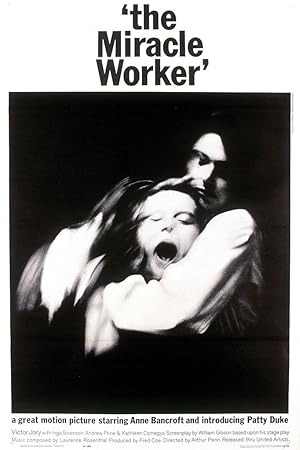
The Miracle Worker Page #3
- NOT RATED
- Year:
- 1962
- 106 min
- 1,108 Views
Helen? Helen!
Helen! Helen, let me out...
Don't worry, they'll find you. | You're not lost.
Only out of place.
And toothless!
- Where's Miss Sullivan? | - Locked in her room.
Locked in her...?
- Helen locked her in and took the key. | - And you sit here and say nothing?
Everyone's been telling me | not to say anything.
- Viney, look out front for Helen. | - She's out by the pump!
I'll look.
- Miss Sullivan. | - Yes, Captain Keller.
Is there no key on your side?
If there were a key, I wouldn't be in here. | Helen took it.
The only thing on my side is me.
Not in the house ten minutes. | I don't see how you managed it.
And even I'm not on my side.
- Viney! | - Yes, sir, Captain Keller?
Put that meat back in the oven!
- She has no key. | - Nonsense. You searched in her pockets?
- Yes. She doesn't have it. | - Katie, she must have the key.
- Take that ladder back! | - Certainly.
- She could have hidden it. | - Where?
Anywhere. Under a stone...
I can't plough up the entire grounds | to find a missin' key.
Jimmy! Bring me a ladder!
Certainly.
What's the baby doing up?
Captain woke her, Miss Kate. | All that hollerin'.
Get back to your work!
- Miss Sullivan! | - Yes, Captain Keller?
- Come onto the roof. | - You have a ladder. How thoughtful.
Come down, Miss Sullivan.
- I don't see how I can. | - I'll carry you.
- It's very chivalrous, but... | - Miss Sullivan, follow instructions.
I will not have you also | tumblin' out of our windows.
I hope this is not what we may expect in | simplifyin' the work of looking after Helen.
Captain Keller, I'm able to go down | a ladder under my own steam.
Miss Sullivan, I doubt it.
Simply hold onto my neck.
My neck, Miss Sullivan!
- I'm sorry to inconvenience you. | - No inconvenience.
Other than taking that door down and | replacing the lock, if we can't find the key.
- I'll look everywhere. | - Thank you.
Do not look in any rooms | that can be locked.
There!
Go, go! What are you looking at? | Nothing for you to look at.
Now...
Would it be possible for us | to have dinner like other people?
- Miss Sullivan! | - Viney, I'll put the baby to sleep.
Oh... Might as well leave the I-a-d-d-e-r.
You devil.
Oh, you think I'm so easily gotten rid of?
You've got a thing or two to learn first.
I've got nothing else to do,
- and nowhere to go. | - Miss Sullivan!
Discipline her
without breaking...
Ink.
Ink.
It has a name.
Down, under, up. | And be careful of the needle.
Right. You keep out of the ink and | perhaps I can keep out of the soup.
All right, all right. Let's try temperance.
Bad...
girl.
Good...
girl.
Yes.
Very good girl.
- What are you saying to her? | - I was just making conversation.
Translation
Translate and read this script in other languages:
Select another language:
- - Select -
- 简体中文 (Chinese - Simplified)
- 繁體中文 (Chinese - Traditional)
- Español (Spanish)
- Esperanto (Esperanto)
- 日本語 (Japanese)
- Português (Portuguese)
- Deutsch (German)
- العربية (Arabic)
- Français (French)
- Русский (Russian)
- ಕನ್ನಡ (Kannada)
- 한국어 (Korean)
- עברית (Hebrew)
- Gaeilge (Irish)
- Українська (Ukrainian)
- اردو (Urdu)
- Magyar (Hungarian)
- मानक हिन्दी (Hindi)
- Indonesia (Indonesian)
- Italiano (Italian)
- தமிழ் (Tamil)
- Türkçe (Turkish)
- తెలుగు (Telugu)
- ภาษาไทย (Thai)
- Tiếng Việt (Vietnamese)
- Čeština (Czech)
- Polski (Polish)
- Bahasa Indonesia (Indonesian)
- Românește (Romanian)
- Nederlands (Dutch)
- Ελληνικά (Greek)
- Latinum (Latin)
- Svenska (Swedish)
- Dansk (Danish)
- Suomi (Finnish)
- فارسی (Persian)
- ייִדיש (Yiddish)
- հայերեն (Armenian)
- Norsk (Norwegian)
- English (English)
Citation
Use the citation below to add this screenplay to your bibliography:
Style:MLAChicagoAPA
"The Miracle Worker" Scripts.com. STANDS4 LLC, 2024. Web. 28 Apr. 2024. <https://www.scripts.com/script/the_miracle_worker_20863>.


Discuss this script with the community:
Report Comment
We're doing our best to make sure our content is useful, accurate and safe.
If by any chance you spot an inappropriate comment while navigating through our website please use this form to let us know, and we'll take care of it shortly.
Attachment
You need to be logged in to favorite.
Log In